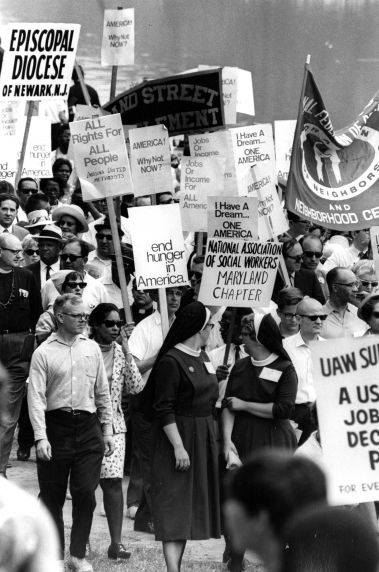50 Years Later: the Kerner Commission and the Poor People's Campaign
On February 29, 1968, The Kerner Commission issued its report on the root causes of urban rebellion in the United States. Though the report was a top-down response to inequality, it was not the only response to growing unrest in American cities. That same year, Ralph Abernathy and Dr. Martin Luther King, Jr. planned the Poor People’s Campaign to address a lack of economic opportunity through grassroots organizing and demonstration.
The 11-member National Commission on Civil Disorders, known as the Kerner Commission after its chairman Otto Kerner, was appointed by President Johnson in the middle of Detroit’s 1967 rebellion. The commission was tasked with identifying ways to prevent future unrest in American cities.
In the mid-1960s, cities across the United States experienced clashes between police and people of color that tipped over a boiling cauldron of frustrations, often resulting in destruction of property and loss of life. The Kerner Commission Report produced a clear outline of the grievances of Black Americans and confirmed that discrimination and lack of opportunity were both real and possible to address.
The report reflected what most urban residents already knew: The United States, despite its relative wealth, denied access to employment, education, welfare, and suitable housing to Black Americans. In order to address civil disorders, the federal government would need to drastically increase opportunity in these areas.
The Kerner Commission, of course, was not the only organization to work toward preventing urban unrest in the 1960s. Dr. Martin Luther King, along with Ralph Abernathy and others in the Civil Rights Movement, also saw institutionalized poverty and lack of opportunity at the root of urban conflict. They planned to bring together poor people of all races in Washington, D. C. to express their disappointment with the federal government’s focus on the Vietnam War rather than the War on Poverty. They called this gathering the Poor People’s Campaign and planned it for the summer of 1968. During the planning process, Dr. King died in April 1968 while supporting striking sanitation workers in Memphis. Again, destruction erupted across the country as people mourned the loss of a central source of hope and pride.
Despite the trauma caused by Dr. King's passing, leaders in the Civil Rights Movement pushed ahead with the Poor People’s Campaign. Starting in mid-May, demonstrators began arriving in Washington and erecting tents and shanties, naming their settlement “Resurrection City.”
The National Mall remained occupied through a rally scheduled for Juneteenth, June 19, which featured speeches from Reverend Abernathy, Coretta Scott King, and more. Labor and religious groups actively supported the event, and the United Auto Workers, along with other unions, bussed members to Washington to participate. Police removed remaining tents from the Mall a few days later when permits had expired.
Despite the clear recommendations of the Kerner Commission, President Johnson did not create a plan to answer the Kerner Commission Report or the demands of the Poor People’s Campaign.
Researchers may find archival material related to the Kerner Commission and the Poor People’s Campaign in several collections at the Reuther Library:
Kerner Commission:
Mayor Jerome Cavanagh Papers reflect the commission’s investigation into Detroit’s Rebellion. Material related to the Poor People’s Campaign can also be found in this collection.
African American scholar Norman McRae’s Papers reflect on the Kerner report, both in 1968 and 10 years later.
Our collections reflect a wealth of information regarding planning and executing the Poor People’s Campaign, including but not limited to:
A number of images from UAW staff photographers and others are available in this image gallery of the Poor People’s Campaign.
National Sharecroppers Fund Records
Center for Community Change Records
Detroit Commission on Community Relations (DCCR) / Human Rights Department Records


 Reddit
Reddit Facebook
Facebook LinkedIn
LinkedIn